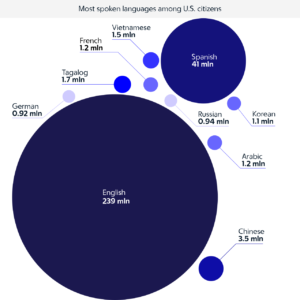Bilingualism
What is bilingualism?
Bilingualism is the ability to speak two different languages or tongues. USA’s Population Census of 2018 revealed that 22% of the country’s population (53 million citizens that year) speaks a second language other than English at home. From that group, 41 million of those Americans are bilingual in Spanish and English.

The importance of bilingualism
The benefits of speaking one or more languages (in addition to our maternal one) have been studied and proven in recent decades, contrary to the old beliefs that speaking more than one language was detrimental to personality and that it created cognitive problems. Today, it’s widely know that learning capacities and social abilities are increased considerably when we develop the skill to express ourselves and communicate in more than one way.
Bilingual Books
Bilingual books are a useful tool for learning a second language. When you show the same story depicted with one image but two sets of words, the young minds learn to describe the same situation in two different tongues, learning the words and meanings side by side. This also broadens the understanding of the conceptualization of actions, going beyond the literal translation of the words.
By knowing a story in two languages, children also acquire the understanding that the same idea or event can be described in more than one way, and that some ideas are portrayed differently in other languages or cultures. This wider learning filter of the bilingual or multilingual mind is therefore much more prepared for a globalized world than a one-language mentality.
